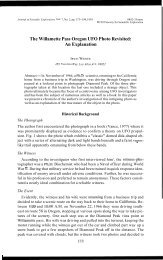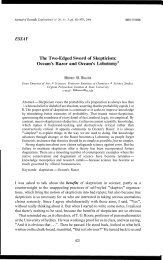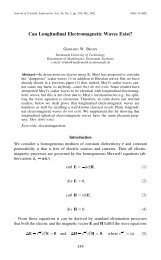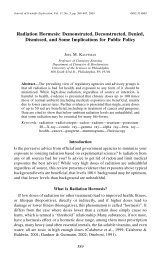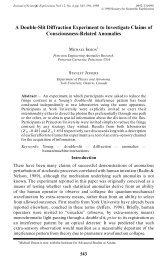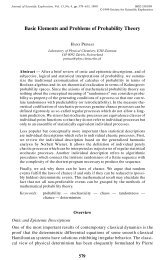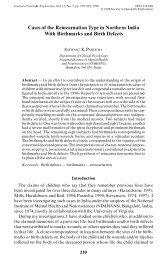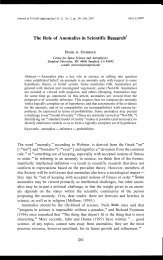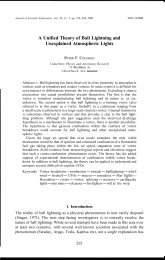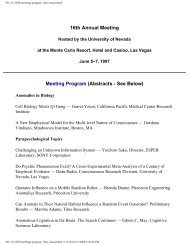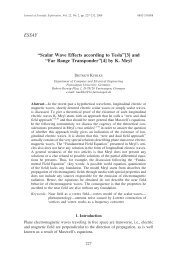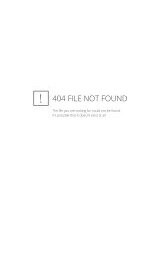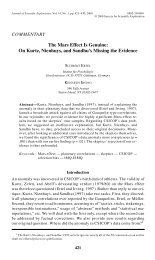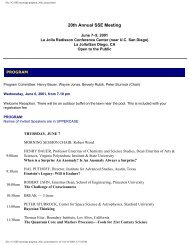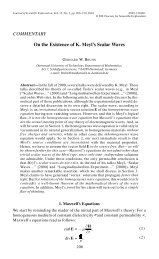A Guide to UFO Research - Society for Scientific Exploration
A Guide to UFO Research - Society for Scientific Exploration
A Guide to UFO Research - Society for Scientific Exploration
Create successful ePaper yourself
Turn your PDF publications into a flip-book with our unique Google optimized e-Paper software.
72 M. D. Swords<br />
of resources, mentioned above, <strong>for</strong>m the working core of the serious researcher's<br />
library. There are other elements of nearly equal importance, and<br />
slowly we will approach the materials the non-<strong>UFO</strong>logist actually wants <strong>to</strong><br />
read (whether they will do them any real good or not).<br />
Every field of any maturity has at least a few standard works which support<br />
the learning and locating process. <strong>UFO</strong>logy has a few. Far and away the most<br />
important single supporting resource in <strong>UFO</strong>logy is George Eberhart's colossal<br />
two-volume bibliographic ef<strong>for</strong>t: <strong>UFO</strong>s and the Extraterrestrial Contact<br />
Movement. Covering all areas of <strong>UFO</strong>-related material and all types of media,<br />
it is endlessly useful <strong>to</strong> the scholar. There are two well-done standard encyclopedias<br />
<strong>for</strong> the field: Margaret Sachs' The <strong>UFO</strong> Encyclopedia and Ronald<br />
S<strong>to</strong>ry's The Encyclopedia of <strong>UFO</strong>s. Both of these works are structured mainly<br />
in the short in<strong>for</strong>mative newsclipping style of encyclopedic list-and-learn-alittle<br />
philosophy. Sachs' book is entirely in this mode. S<strong>to</strong>ry's employs many<br />
different writers and tends <strong>to</strong> have longer commentaries. Both are well-researched<br />
and worth owning. A third encyclopedia in multi-volumes is being<br />
produced piecemeal at this moment: Jerry Clark's <strong>UFO</strong> Encyclopedia slated<br />
<strong>for</strong> three volumes. Two have appeared as of 1992: <strong>UFO</strong>s in the 1980s and The<br />
Emergence of a Phenomenon. The third volume will fall in the intervening<br />
time period. Clark's writing takes advantage of his grcat literary skills and<br />
long-time involvement in the field. The entries tend <strong>to</strong> be idiosyncratic <strong>to</strong> his<br />
interests, but his interests have been so wide as <strong>to</strong> allow good coverage anyway.<br />
The pieces tend <strong>to</strong> be in the manner of his<strong>to</strong>rical research essays stacked <strong>to</strong>gether<br />
with biographical notes in an encyclopedic alphabetical array. Clark is<br />
an excellent his<strong>to</strong>rical researcher and the encyclopedia will become a <strong>UFO</strong><br />
classic.<br />
The standard his<strong>to</strong>ry of the field is David Jacobs' The <strong>UFO</strong> Controversy in<br />
America, one of the few books on our subject published by a scholarly press..<br />
It is the fruit of Dr. Jacobs' Ph.D. thesis and the research depth and excellence<br />
shows it. It is now being, and will someday be even more so, supplemented by<br />
a rather different sort of "his<strong>to</strong>ry": a many-volumed year-by-year collation of<br />
<strong>UFO</strong> events by Loren Gross. Digging heroically in<strong>to</strong> the minutiae of press coverages,<br />
government documents, and whatever else is findable, Gross is slowly<br />
producing a documentary retelling of the phenomenon. <strong>UFO</strong>s: A His<strong>to</strong>ry has<br />
laboriously worked its way in<strong>to</strong> the mid-50's with over a dozen volumes passing<br />
the assembly line. A last "support work" type of volume which deserves<br />
mentioning is the "How <strong>to</strong> Do <strong>UFO</strong> <strong>Research</strong>" book. There are many investiga<strong>to</strong>r<br />
manuals which have been offered, but the classic remains Allan Hendry's<br />
The <strong>UFO</strong> Handbook. A second very useful aid is Richard Haines' Observing<br />
<strong>UFO</strong>s.<br />
These constitute the major working elements of the <strong>UFO</strong>logical research library:<br />
primary data documents, primary government documents, data-collections,<br />
depth research publications, and important support resources. Almost<br />
none of this rates high in readability by the layman. These materials are but-



